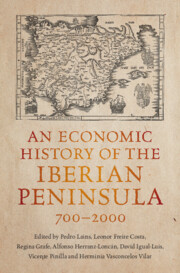Book contents
- An Economic History of the Iberian Peninsula, 700–2000
- An Economic History of the Iberian Peninsula, 700–2000
- Copyright page
- Contents
- Figures
- Tables
- Contributors
- Preface: By Way of Presentation
- Introduction
- Part I The Making of Iberia, 700–1500
- Part II Globalization and Enlightenment, 1500–1800
- 10 Patterns of Iberian Economic Growth in the Early Modern Period
- 11 Population of the Iberian Peninsula in the Early Modern Period: A Comparative and Regional Perspective
- 12 Institutions and Policy, 1500–1800
- 13 Early Modern Financial Development in the Iberian Peninsula
- 14 Science, Knowledge and Technology, 1500–1800
- 15 Living Standards, Inequality and Consumption, 1500–1800
- 16 Trade and the Colonial Economies, 1500–1828
- 17 The Economic History of Iberia in a Wider Context, 1500–1800
- Part III Industrialization and Catching Up, 1800–2000
- References
- Index
13 - Early Modern Financial Development in the Iberian Peninsula
from Part II - Globalization and Enlightenment, 1500–1800
Published online by Cambridge University Press: 22 February 2024
- An Economic History of the Iberian Peninsula, 700–2000
- An Economic History of the Iberian Peninsula, 700–2000
- Copyright page
- Contents
- Figures
- Tables
- Contributors
- Preface: By Way of Presentation
- Introduction
- Part I The Making of Iberia, 700–1500
- Part II Globalization and Enlightenment, 1500–1800
- 10 Patterns of Iberian Economic Growth in the Early Modern Period
- 11 Population of the Iberian Peninsula in the Early Modern Period: A Comparative and Regional Perspective
- 12 Institutions and Policy, 1500–1800
- 13 Early Modern Financial Development in the Iberian Peninsula
- 14 Science, Knowledge and Technology, 1500–1800
- 15 Living Standards, Inequality and Consumption, 1500–1800
- 16 Trade and the Colonial Economies, 1500–1828
- 17 The Economic History of Iberia in a Wider Context, 1500–1800
- Part III Industrialization and Catching Up, 1800–2000
- References
- Index
Summary
Iberian colonies produced the vast majority of world precious metals in the Early Modern period, which increased liquidity in the Iberian Peninsula. The chapter focuses on the relationship between liquidity and financial development – including other relevant variables such as instruments and institutions – to examine the efficiency of the financial systems in Castile and Portugal. Public credit, debt management and the cost of public debt service are considered, as well as private debt, the diversity of financial instruments and the cost of capital. Finally, the authors compile their perspective on the main similarities and differences in the development of the financial systems of Castile and Portugal.
- Type
- Chapter
- Information
- An Economic History of the Iberian Peninsula, 700–2000 , pp. 335 - 357Publisher: Cambridge University PressPrint publication year: 2024



